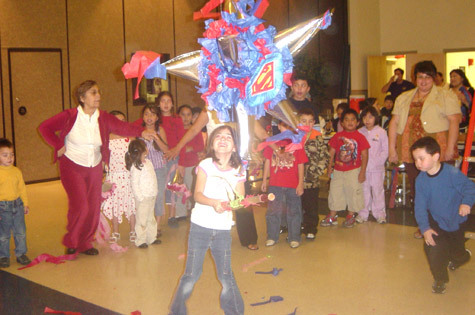
Las Posadas are an ancient Advent tradition in Hispanic countries, the southwest and in many larger cities with a large Hispanic Catholic population.
Las Posadas, which means "the inns" in Spanish, traditionally starts Dec. 16 and continues through Christmas Eve. The novena is a reenactment of St. Joseph and St. Mary, who is about to give birth to Jesus, seeking shelter. The people gather in two groups, an outside group, which goes to the door of a house and someone knocks at the door. The group, in a song, asks for shelter. Those inside respond in song, denying shelter, saying there is no room at the inn or posada.
The outside group does this three times; on the third time they finally gain entrance. As they walk in, both groups sing a song in Spanish about holy pilgrims or travelers. The group prays the rosary, followed with a little fiesta, which might include hot chocolate, cookies and perhaps even a piñata for the children.
Sometimes, the last Posada is held at the parish and as the pilgrims or travelers enter, it is the entrance procession for the midnight Mass.
Several parishes around the Diocese of Little Rock are planning these celebrations, including St. Edward Church in Texarkana, which is bringing it back, and St. Joseph Church in Fayetteville.
Araceli Martinez said she remembers St. Edward holding Posadas years before, but they stopped.
A resident of Texarkana for the last 15 years, Martinez, a native of Mexico, recalls celebrating the Posadas as a child.
"I remember we celebrated them because we were awaiting the birth of Jesus," Martinez said. "We had the Holy Family in procession and asked to stay in the houses, we went to three houses and in the third the Holy Family stayed."
The Posadas will be held each night at St. Edward Church.
"It is very important to me because it is something good, something beautiful and apart from that, if we do not continue the tradition it will be lost and our children will not know anything about it. So it is important to continue, so it is not lost," Martinez said.
Parishioners stopped attending, which is why they were not held for a while, she said.
"But I told them that we should persevere and not expect many to attend at first but if we continue the number of people will grow," Martinez said.
It also reminds us of the true meaning of the season, she added.
"Sometimes we are so busy and harried buying presents and all that but we forget what is most important," Martinez added. "This reminds us that Christmas is coming, the birth of Christ. The important message is for us to prepare for the birth of Christ instead of buying and buying presents at the store and forgetting the most beautiful and important thing. We need to show our children it is not as important to prepare ourselves with presents but to prepare ourselves to receive Christ."
The Posadas will be at 7 p.m. Dec. 16 starting with a Bible reading, asking for shelter, a rosary and a little celebration after. All are invited, she said.
In the Fayetteville area, Catholics are invited to a similar Posadas at St. Joseph, said Lucy Morlet, director of parish life and Hispanic ministries.
There, parishioners will be going to different houses for the Posadas, ending up at the parish.
"Our tradition is that starting on Dec. 16, several families receive the holy pilgrims and every one of those families is in charge of the Posada," Morlet said. "Some families have only the rosary, offer some chocolate and Mexican sweet bread, others will have piñatas, and it depends on each family."
Typically, they hold the Posada at church on a Saturday. This year it will be Dec. 19, she said.
"We gather, pray the rosary, ask for shelter, break the piñata, followed by a covered dish supper," at the parish, she said.
Morlet estimated the Posadas have been held in Fayetteville for 15 years.
"This teaches us the true meaning of Christmas. Jesus Christ was born in a manger, teaching us humility. It teaches us most importantly, that Christ was born in the most humble manner possible and that is how he wants us to be," Morlet said.
"This reminds us, brings us closer to our heritage," she said.
Please read our Comments Policy before posting.
Article comments powered by Disqus Fort Smith church raising $2.5 million for security
Fort Smith church raising $2.5 million for security
 MSM senior an all-around winner in classroom and track
MSM senior an all-around winner in classroom and track
 Mount St. Mary alum rallied community after wreck
Mount St. Mary alum rallied community after wreck
 Deacon served in two Central Arkansas parishes
Deacon served in two Central Arkansas parishes
 Catholic Answers receives backlash for its AI priest
Catholic Answers receives backlash for its AI priest
 I knew in fifth grade Jesus was my best friend
I knew in fifth grade Jesus was my best friend
 St. Joseph a model of solidarity with immigrants
St. Joseph a model of solidarity with immigrants
 Two gifts after Jesus’ death: Virgin Mary and Eucharist
Two gifts after Jesus’ death: Virgin Mary and Eucharist
 Why we have an altar, and not just a communion table
Why we have an altar, and not just a communion table
 Pope: Wars should be resolved through nonviolence
Pope: Wars should be resolved through nonviolence